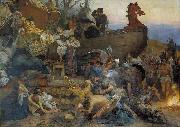|
||||||||||
|
|
||||||||||
|
Christ and Sinner, Gemälde ID:: 60856 Siehe Galerie in Schweden |
Christ and Sinner, Christ and Sinner, version of 1875 Christ_and_Sinner,_version_of_1875 |
|||||||||
|
|
||||||||||
|
Nero torches, Gemälde ID:: 60857 Siehe Galerie in Schweden |
Nero torches, Nero's torches, 1877 Nero's_torches,_1877 |
|||||||||
|
|
||||||||||
|
Night on the eve of Ivan Kupala Gemälde ID:: 60858 Siehe Galerie in Schweden |
Night on the eve of Ivan Kupala Night on the eve of Ivan Kupala Night_on_the_eve_of_Ivan_Kupala |
|||||||||
|
|
||||||||||
|
Burial of a Varangian Chieftain Gemälde ID:: 60859 Siehe Galerie in Schweden |
Burial of a Varangian Chieftain Burial of a Varangian Chieftain Burial_of_a_Varangian_Chieftain |
|||||||||
|
|
||||||||||
|
Dirce, Gemälde ID:: 60861 Siehe Galerie in Schweden |
Dirce, Dirce, 1897 Dirce,_1897 |
|||||||||
|
|
||||||||||
| Vorheriger Künstler Nächster Künstler | ||||||||||
|
|
||||||||||
| Henryk Siemiradzki | ||||||||||
| (1843-1902) was a Polish Academic painter. He was particularly known for his depictions of scenes from the ancient Graeco-Roman world and the New Testament. Siemiradzki was born to a Polish szlachta family of a military physician in the village of Novobelgorod (now Pechenegi) near Kharkov, Ukraine. He studied at Kharkov Gymnasium where he learned painting under a scion of Karl Briullov, D. I. Besperchy. He entered the Physics-Mathematics School of Kharkov University but continued his painting lessons from Bespechy. After graduating from the University with the degree of Kandidat he abandoned his scientific career and moved to Saint Petersburg to study painting at the Imperial Academy of Arts in the years 1864-1870. Upon his graduation he was awarded a gold medal. In 1870-1871 he studied under Karl von Piloty in Munich on a grant from the Academy. | ||||||||||
|
|
||||||||||
IntoFineArt Co,.Ltd.














